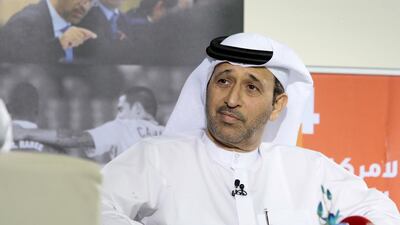The confusion over the postponement of the 2015 Gulf Cup of Nations continues. The 23rd edition of the competition, set to take place in Kuwait, was last week delayed from December for at least a year.
Or was it?
Rumours circulating in the Arabic media over the past few days has hinted that the Kuwait Football Association, under pressure from the country’s General Authority for Youth and Sports, might reconsider holding the tournament this December as originally slated, citing that to postpone the regional competition would paint the Gulf country in a bad light.
In the meantime, the Arabian Gulf League, as well as other domestic leagues in the GCC, including Kuwait’s, have either been postponed or put on hold due to KFA’s initial decision.
A U-turn now will cause even further disruptions. In the long term, expect more damage to the reputation of a competition that never seems to be too far from controversy and confusion.
There does appear one obvious solution to the never-ending organisational issues, according to the president of the UAE FA.
“We hope that [the individual federations] can come to an agreement over the creation of a permanent committee that can handle every logistical and marketing aspect of the tournament.”
The words of Yousef Al Serkal came during last year’s Gulf Cup in Saudi Arabia, but they would not have been out of place at any point during the competition’s 45-year history.
Incredibly, while other sports within the GCC have their own organising committees, no regional body currently has total oversight of a competition that has been played on an almost biennial basis since 1970.
As things stand, the host nation — agreed upon by the participating associations during ad hoc meetings — is in sole charge of scheduling, marketing and selling television rights.
The Gulf Cup is not a Fifa-sanctioned competition, and will not gain such status unless a fixed, bi-annual schedule for the competition can be confirmed.
In the absence of a ruling body capable ofimplementing this, as well as solving the constant bickering between rival associations, this remains some way off.
The competition has seen its share of controversy, none more so than the last one.
The last two tournaments had been awarded to Iraq, but for sociopolitical reasons, they did not meet the criteria to host the tournament. The 2014 Gulf Cup was moved to Saudi Arabia as a result, and the latest one to Kuwait.
If any Gulf Cup was screaming out for a rescheduling, then it was the 2014 edition in Riyadh, which ended only six weeks before the start of the 2015 Asian Cup in Australia. With Yemen the only one of eight GCC countries not involved in the continent’s biggest competition, bringing the Gulf Cup forward or, more realistically, postponing would have been welcomed by everyone.
Al Serkal, a long-time advocate of a full-time Gulf Cup committee, had a few doubts on the eve of the big kick off.
“We tried to convince the Saudis to have a bigger gap between the two tournaments,” he said. “For any team, except Yemen, whoever loses has another chance at the Asian Cup. It’s our duty to look after the team in both cases, and we will be ready whether we win or lose.”
Another major disagreement arose over the distribution of TV rights, which for years remained free for all broadcasters in the region. But in 2014 a tiered system was introduced for the first time that called for certain television stations, including Qatar’s beIN Sports, Abu Dhabi Sports and Dubai Sports, to pay up to US$15 million (Dh55.1m) for the right to broadcast the two-week-long competition.
“This is a tournament for all football fans and media in the Gulf. Why should one television station in one country broadcast and another can’t because the cost is prohibitive?” Al Serkal said. “I call on the heads of federations to take a stand. If this was in the UAE, we would be ready to hand over for the greater good.”
Al Serkal saw the situation as unsustainable, and predicted trouble ahead for the competition if a consensus was not reached.
“If this carries on, it will affect not just its existence, but even its unique flavour too,” he said.
The constant changing of dates also has serious consequences for players, especially those who play in foreign leagues for clubs that have no obligation to release them for a non-Fifa sanctioned event. In Saudi Arabia last year, two Iraqi players — midfielder Yaser Kasim, the 2013 Asian Young Player of the Year, and defender Ali Adnan — had to return to their respective clubs in Europe halfway through the tournament.
Now, associations, managers and players are left in limbo again and must await a final decision from the Kuwaiti FA on whether this tournament will go ahead as originally planned or in 2016, which could disrupt their domestic, continental and international schedules further still.
It should be a joint decision, designed to benefit all. The time has come for a full-time Gulf Cup committee.
FOLLOW US ON TWITTER @NatSportUAE

